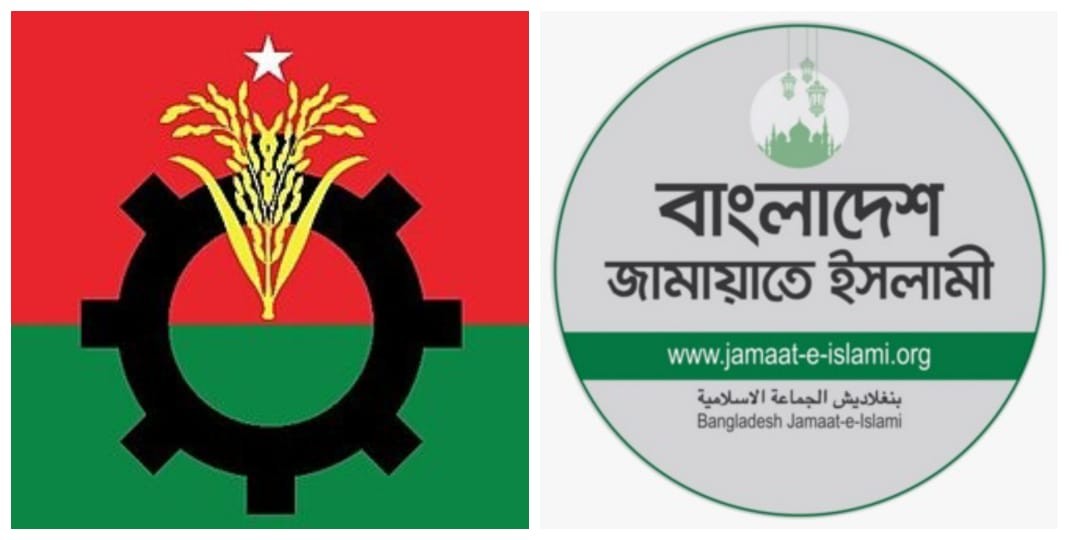The rivalry between the Bangladesh Nationalist Party (BNP) and Jamaat-e-Islami is worsening by the day, with the country’s two major political forces engaging in escalating verbal attacks against each other in their regular political activities.
BNP has revived some old slogans against Jamaat, labelling the party as Razakars for its role against the Liberation War in 1971. In response, Jamaat is highlighting the involvement of BNP leaders and activists in crimes including murder, rape, and extortion.
The feud has also extended to the digital domain, where propaganda content is circulating on social media platforms to malign each other politically.
The parties have even taken contradictory stances on various reforms undertaken by the interim government, including those related to elections and other major issues.
Yet, these two parties were once inseparable partners in Bangladesh’s political theatre, shaping the country’s governance and electoral battles for decades.
The foundation of their alliance was laid during the rule of BNP founder General Ziaur Rahman. Following the political vacuum created by the assassination of Sheikh Mujibur Rahman in 1975, Zia sought to consolidate power by accommodating anti-Awami League forces.
Among them were Jamaat leaders, who had been banned after independence for opposing the Liberation War. Zia lifted the ban on religion-based politics in 1979, allowing Jamaat to re-enter the political scene.
He also allowed Ghulam Azam, Jamaat’s wartime ameer, to return to Bangladesh on a Pakistani passport. Azam was later granted Bangladeshi citizenship.
The alliance served both sides. Zia used Jamaat and other right-wing elements to counterbalance the pro-liberation narrative of the Awami League. Jamaat, in turn, regained political legitimacy under BNP’s protection.
The relationship matured into formal electoral partnerships. Most notably, in the 2001 general election, BNP and Jamaat jointly formed the four-party alliance and won a landslide victory.
Jamaat secured 17 seats and two ministries—industries and social welfare—in the cabinet, further embedding the partnership in national politics.
However, tensions emerged in the mid-1990s. Following the controversial February 1996 general election—held under BNP rule and boycotted by the Awami League—Jamaat shocked its ally by siding with the AL and joining calls for a non-partisan caretaker government.
Despite this betrayal, BNP and Jamaat reconciled by 2001. However, the partnership began to deteriorate again after 2008. As the AL launched war crimes trials, several Jamaat leaders were executed for their role in 1971.
Under pressure, BNP began distancing itself. In the 2018 election, BNP fielded no Jamaat candidates under its alliance banner.
After the 2018 polls, the two parties took divergent paths, which became even more evident following the fall of the Sheikh Hasina government in August last year.
Despite this reality, top leaders of the two parties have tried to play down their ever-deteriorating rivalry.
BNP Standing Committee member Mirza Abbas said relations between the two parties have soured for various reasons.
“Jamaat will never be able to form government and that’s why the party is conspiring to delay the national election, going against the BNP’s demand for an election by February next. They are also spreading lies about BNP,” Abbas told TIMES of Bangladesh.
He added that Jamaat has never acknowledged 1971 and the Liberation War, which is why the people of the country have not accepted them.
On the contrary, BNP is a party of the Liberation War and its founding leader was a hero of the Liberation War. This reality, he said, has come into play now.
Avoiding a direct comment about the feud, Assistant Secretary General of Jamaat Hamidur Rahman Azad said rivalry in politics is nothing new.
“We were partners for 17 years and forged movements to dislodge Hasina. Now we are on different political paths where one party may not like what the other is saying,” he told Times of Bangladesh.
Since the dramatic political shift in August 2024, which saw the fall of Hasina, the rivalry between BNP and Jamaat has surfaced more visibly, turning once-allies into open rivals. Both parties are now scrambling to reposition themselves in the changed political landscape.


